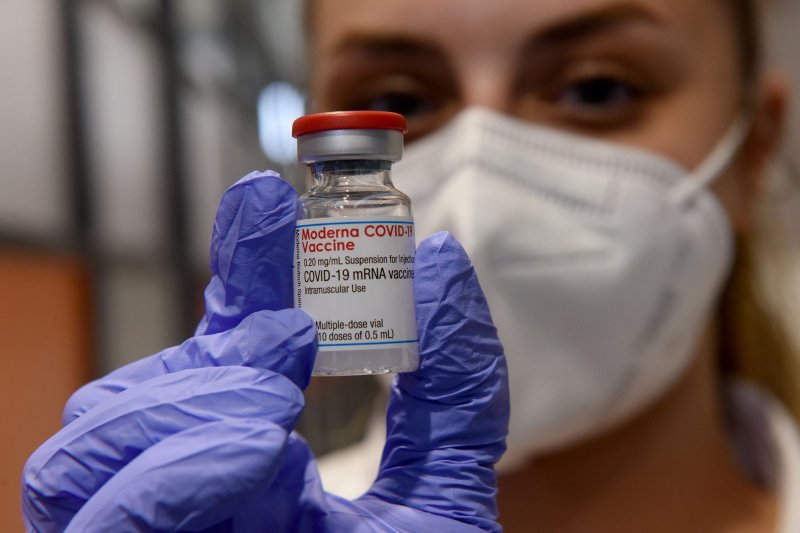1 of 5 | The two-dose COVID-19 vaccines from Moderna and Pfizer-BioNTech offer less protection against infection for older adults and those with chronic conditions, but still are effective in most cases, according to a new study. File photo by Debbie Hill/UPI |
License Photo
Dec. 20 (UPI) -- The Moderna and Pfizer BioNTech COVID-19 vaccines are less effective at protecting older, less healthy adults against infection than they are for younger, healthier recipients, a study published Monday by the Annals of Internal Medicine found.
However, they still prevent severe illness and death from the virus in the majority of older recipients, the data showed.
Seniors who were fully vaccinated with either of the two-dose shots had 69% protection against infection within seven days of their last inoculation, lower than the roughly 90% figure reported in earlier studies, the researchers said.
Still, the vaccines provided 86% protection against death from the virus up to three months after receipt of the second dose, according to the researchers.
"Vaccine effectiveness against infection is only around 69% during longer follow-up after vaccination in an elderly population, which is much lower than vaccine effectiveness levels previously reported," study co-author Dr. George Ioannou told UPI in a text message.
"To me this means two things: First, we have to strive to achieve even higher levels of vaccination in the population and, second, even with high levels of vaccination, additional infection mitigation efforts remain necessary," said Ioannou, a professor of gastroenterology at the University of Washington.
In clinical trials, the Moderna and Pfizer-BioNTech vaccines were found to offer at least 90% protection against symptomatic illness from COVID-19.
Made with similar formulations, both require two doses for maximum protection, according to the Centers for Disease Control and Prevention, and the agency now recommends booster doses six months or more after the second shot.
For this study, Ioannou and his colleagues at the Veterans Affairs Puget Sound Health Care System assessed the COVID-19 infection and death rates among about 2.1 million U.S. military veterans who received at least one dose of either of the two-shot vaccines Dec. 11 and March 25.
They then compared the data to those for roughly the same number of unvaccinated veterans, they said.
Study participants were tracked through June 30, by which point the more contagious and lethal Delta variant was the predominant one in the United States, according to the CDC.
Just over 92% of the study participants were men, and most were ages 65 and 79 years and either overweight or severely overweight, or obese, the researchers said.
Roughly one-third of the participants had diabetes, while12% had chronic kidney disease, 5% had severe heart disease and 15% had chronic obstructive pulmonary disorder, the data showed.
All of these chronic health conditions place people with them at greater risk for serious illness from COVID-19, according to the CDC.
The two two-dose vaccinates offered 75% protection against protection against infection among participants ages 18 to 64 years, and 72% among those ages 65 to 74 years, the data showed.
However, after two shots, participants age 75 years and older had 61% protection against infection, while those with two or more chronic health conditions also had less than 70% protection, the researchers said.
The vaccines offered up to 89% protection from death due to COVID-19 across all age groups, but were slightly less effective in those with two or more chronic health conditions, they said.
The vaccine effectiveness was measured after the Delta variant emerged, but before the potentially more contagious Omicron strain started to spread nationally, according to the researchers.
These findings suggest that protection against infection from COVID-19, even among vaccinated individuals, will require continued attention to additional prevention measures such as masking and social distancing, even with vaccination, they said.
"The emergence of the Alpha, then Delta and now Omicron variants demonstrates that the only constant thing about the COVID-19 pandemic is that it is constantly changing," Ioannou said.
"New variants tend to have higher transmissibility, and therefore, we will need to continue to emphasize masking, physical distancing, screening and contact tracing, including among vaccinated persons," he said.















